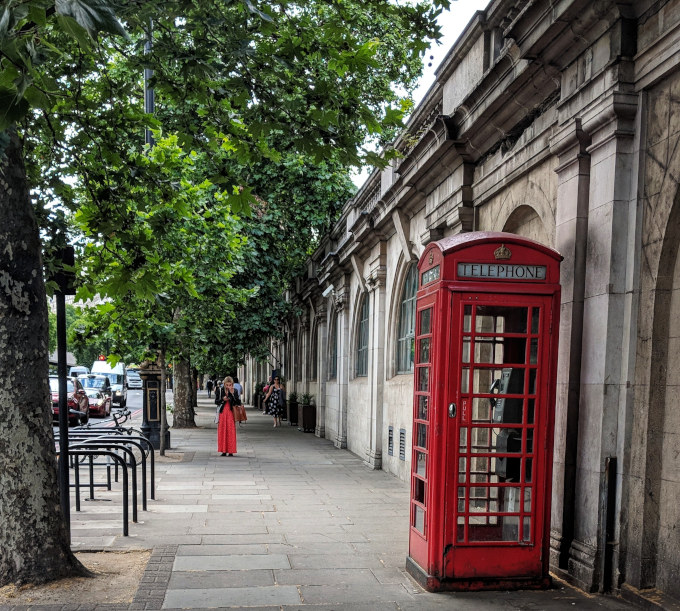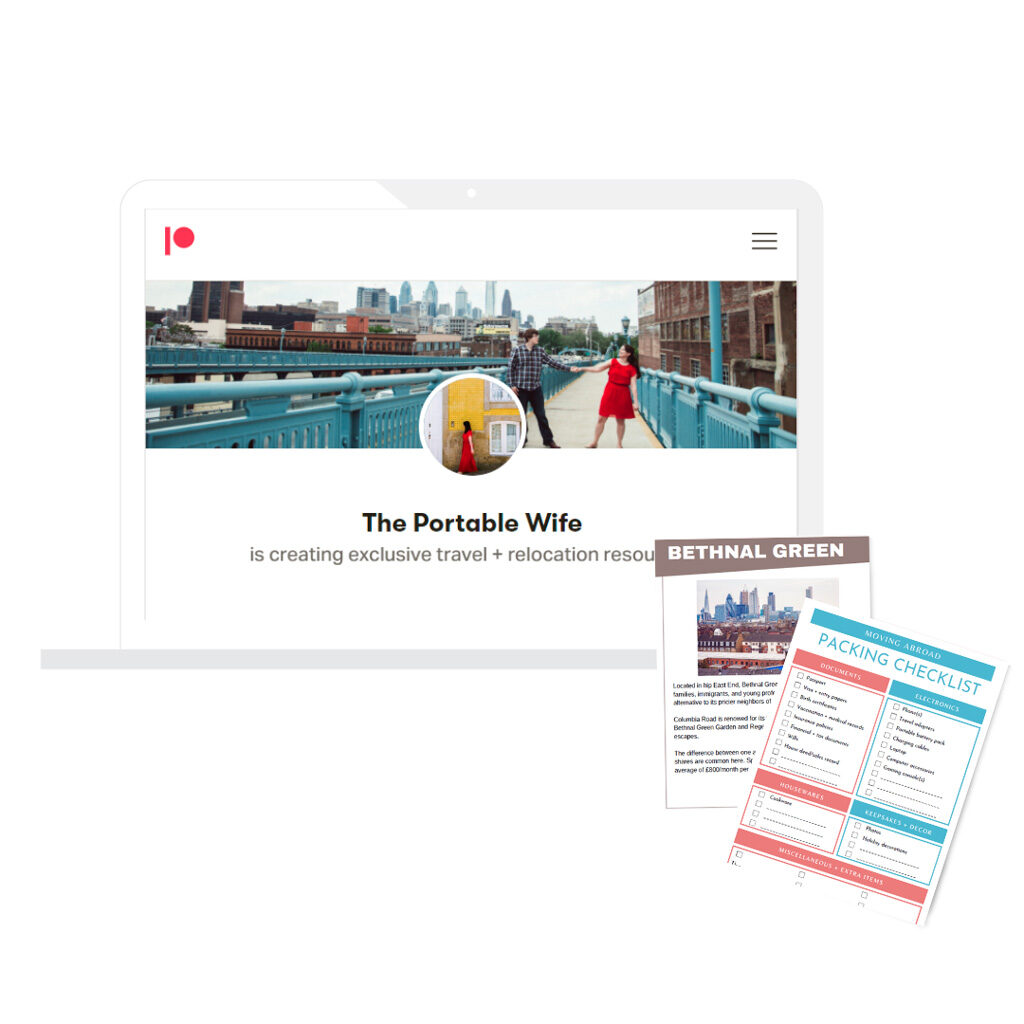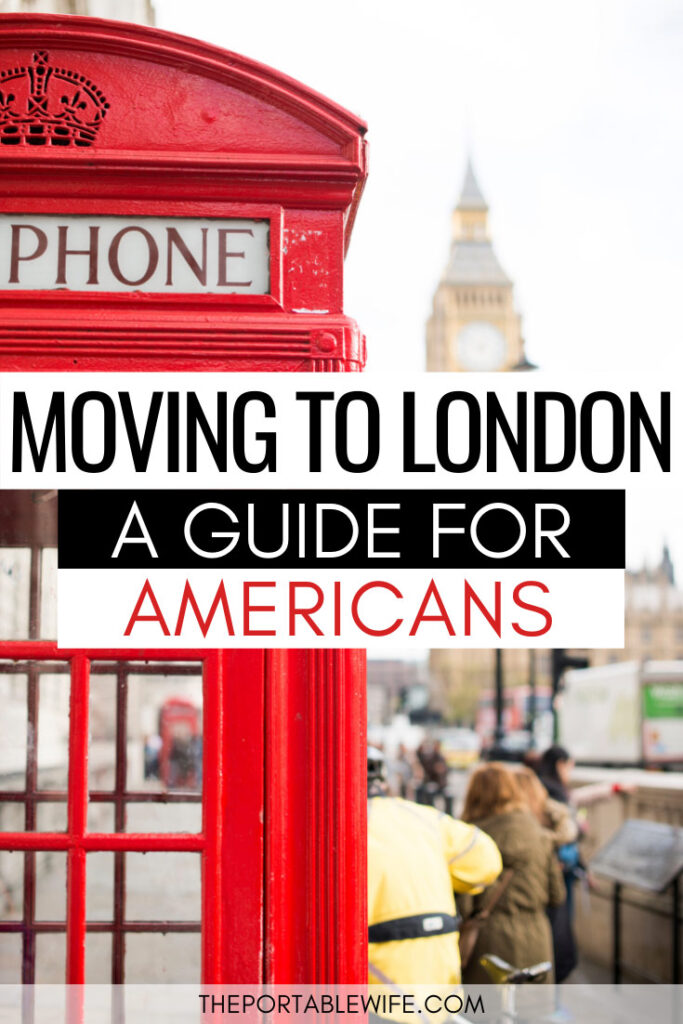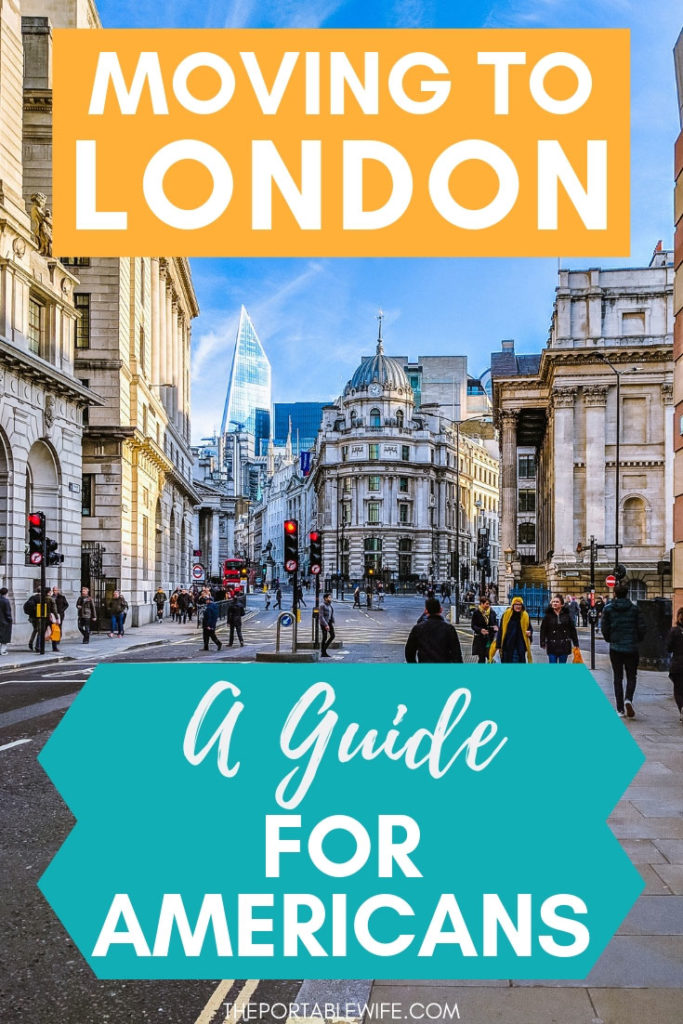London is home to more than 3 million foreign-born residents, making it one of the most multicultural cities in the world. Between its rich history, diverse cuisine, and easy access to the Continent, moving to London from the US brought plenty of excitement to my life.

As an American living in London, I’ve found the city to be the perfect balance between the new and the familiar. But don’t let our countries’ shared history fool you.
There are plenty of ways that Americans will need to adjust to living in the UK, for better or worse.
If you’re deciding whether to move abroad and are considering The Big Smoke, here’s what you should know before moving to London from the US.
This post contains affiliate links. As an Amazon Associate, I earn from qualifying purchases. For more information, click here.
RELATED: 24 Pros and Cons of Living in London
You can’t move to London from the US without a visa

When I first published this post, I never imagined I’d need to say this. But in case you didn’t know: a US citizen cannot live in the UK without a visa.
Any American moving to London will need to obtain a visa–usually from within the US–which can take weeks to months depending on the circumstances.
It’s illegal to work in the UK on a tourist visa (including as a digital nomad), or even go job hunting, and getting caught will likely result in both deportation and a permament ban.
The UK has become increasingly strict about immigration now that Brexit has passed. It’s a notoriously difficult country to move to as an American. But there are options if you’re willing to put in the effort.
How to move to London: the main pathways
From marriage to master’s degrees, Americans moving to London have a few pathways to get here. These are the most common ways to get a UK resident visa as an American:
- Marry a UK citizen
- Attend college or university in the UK
- Get hired and sponsored by a UK company
- Transfer to a UK office within your current company
- Possess exceptional talent or promise in a desirable field
This is not an exhaustive list of UK visa opportunities. I highly recommend reading the UK goverment page on visas and immigration to fully understand your options and the requirements for each visa type.
Some visas, like the Tier 4 Student Visa or Tier 2 Intra-Company Transfer Visa, have no path to citizenship, so do your research.
Check out my in-depth guide on how to move to the UK for more information!
Your healthcare will be (sort of) free
Compared to the nightmare that is the American healthcare system, the UK’s National Health Insurance (NHS) is a dream.
I’d argue it’s one of the best things about living in Enland. The system isn’t perfect, but it does provide healthcare to all residents, regardless of their employment status.
Nearly all medical services and treatments are free, with the exception of certain things like prescriptions and dental procedures. And even those are far cheaper than what you’d typically pay in the US with an average employer insurance plan.
But as they say, nothing in life is truly free. Most people who move to the UK will need to pay the immigration health surcharge when making their visa application.
The amount you have to pay depends on your visa type and your length of stay. If you’re not coming to the UK as a student, you’ll pay £200 for every year of your visa.
This is a little more than what I would pay in a typical year in the US, but I had a pretty generous insurance plan and was in good health.
You’ll also be funding the NHS through your taxes. The amount of money you’ll pay in UK taxes will likely be much higher than what you paid in the US.
Despite the lower take-home pay, I’d rather live in a country where people aren’t filing for bankruptcy because their child was diagnosed with cancer.
That being said, many people (including myself) pay for private health insurance. This gives me access to faster appointments, a wider range of specialists, and even healthcare coverage when I’m back in the US.
How to Find the Best International Health Insurance for You
Even in countries with universal health care, buying an international health insurance plan makes sense for a lot of expats (especially Americans).
But between deductible rules and coverage areas, it’s hard to know which plan is right for you.
Luckily, the brokers at International Citizens Insurance can help you find the right plan for your specific situation. They will do the research, compare plans, and review options with you. A good broker will save you so much time, and best of all, there is no cost to you!
With International Citizens Insurance, you’ll have your pick of plans from the best international health insurance companies (Cigna, GeoBlue, Aetna, etc.). A dedicated agent will answer all of your questions, walk you through the terms and coverage, and make adjustments so that you end up with a plan and premium that works for you.

You’ll spend a lot less on your cell phone plan
According to Money Savings Pro, the average American’s cell phone bill is $80/month. Although I was paying closer to $45/month with my Project Fi plan, that’s still more than double what I’m paying in the UK!
Currently, I’m on an O2 pay-as-you-go tariff, which is £15/month for 1000 texts, 500 minutes, and 15GB of data with rollover. I can also use my mobile data in a number of European countries at no cost, unlike US carriers that charge daily fees.
With so much competition in the UK cellular market, prices are kept very low. And being on a month-to-month payment plan means I can easily switch carriers if I find there’s a better deal. The amount of money I save on my cell phone bill makes the cost of living increase less of a burden.
Your taxes will get complicated when living in London as an American
Spoiler alert: all US citizens are obligated to file a US tax return no matter where they live. If you thought old Uncle Sam couldn’t reach into your wallet from across the pond, you were mistaken!
If you’re moving to London from the US, I have some good news and some bad news.
The good news is that the US and UK have a tax treaty that allows you to deduct your UK taxes from what you’d owe in the US.
There are exceptions to this of course, because nothing about US taxes is ever simple. US expats earning investment income, for example, will owe tax on the profits.
The bad news is that there are additional US tax forms for citizens living abroad, including the FBAR for foreign bank accounts. It can get very complicated very quickly.
Depending on your financial situation, you may end up paying several thousand dollars (yes, you read that right!) to a professional to ensure your taxes are done right. We hired a dual UK / US expat tax firm to handle our US returns, and it cost around $2,000.
Some day, I’ll write a detailed post on expat taxes. In the meantime, start saving for that tax preparation bill.
How to Easily Transfer Money Between US and UK Accounts
One of the most common questions I get asked is how to move money between US and UK bank accounts without paying a fortune in fees. Luckily, there’s an easy and cheap solution:
I first used Wise (formerly TransferWise) when we needed to pay our London flat deposit, and it was SO much simpler and cost-effective than doing an international wire transfer from my bank. Today, I regularly use Wise to send money from my UK bank account to my US accounts.
And because I wanted access to a UK bank account right away, I opened a Wise Multi Currency Account. It lets me send and receive money in over different 40 currencies, and even comes with a multi-currency debit card! You can start paying for things in pounds before you even arrive in the UK.
Open a Wise account today to get real exchange rates, speedy transfers, and ultra-low fees.
Save me for later!
You’ll need to learn new words for familiar things

Everyone knows about “chips”. But for Americans that haven’t traveled abroad, expect to encounter many different and sometimes confusing terms for familiar things.
I’ve even written an entire post on British vs American words and slang to help you overcome the language barrier.
Here are just a few to keep in mind at London’s grocery stores and in daily life:
- Chips are steak fries, but not all fries are chips. If you see “fries” on a menu, they’ll be thin-cut like what you’d get at McDonalds.
- Crisps are (American) chips, and you’ll find fun flavors like prawn and sweet chili on grocery store shelves.
- Courgettes are zucchini. Because French words sound fancy.
- Rocket is arugula, and you’ll find it in all sorts of salads and brunch dishes.
- Trousers are pants, but pants are underwear. Don’t embarrass yourself at the dry cleaner like I did my first week here.
- Cheers means thanks, but only in a casual way. You say “cheers” when someone brings you a beer, but not when you’re being served tea at The Aqua Shard. Unless you want the waiter to laugh at you. Not that I would know…
RELATED: Cheap Eats in London: A Budget Travel Guide
Your utilities will be billed very differently
Back to the serious stuff. In most US cities, you pay monthly bills for your water, gas, and electricity to the lone providers of those utilities in your area.
If you’re fortunate enough to have a choice in providers, the amount you’ll save on your bill rarely offsets the hassle of switching.
In London, there are tons of options for utility providers and payment schedules. There’s even a handy website called uSwitch that lets you compare prices and suppliers for your address.
For electric and gas, most providers let you pay monthly, quarterly, or annually. If you pay monthly or quarterly, the amount will be based on the estimated average for the year, divided by the number of payments.
Depending on how your house/flat is set up, you may need to submit a gas and electric meter reading every couple of months. Places equipped with a Smart Reader are billed by usage, like a typical US residence.
For water, you’ll likely be served by Thames Water. If your place has a water meter, you’ll be billed twice a year.
Flats/houses without water meters, like ours, are billed annually. However, you are not required to pay in a lump sum (though we chose to do so for convenience). Thames Water allows you to pay in installments, as frequently as once a week.
Although the price of gas and electricity is more expensive in the UK than the US, the milder weather means less energy goes towards heating and cooling. Overall, our utility bills are cheaper here than when we lived in a similar-sized flat in Philadelphia.
What about moving to London with pets?
Moving to the UK with pets was by far the most stressful part of our relocation. It’s also the topic I get asked about most frequently, which isn’t surprising!
Between the paperwork requirements, logistics, and lack of pet-friendly landlords, it’s incredibly difficult to DIY. Not to mention that a single mistake can lead to an expensive quarantine or denied entry.
I highly recommend working with a pet relocation specialist like Pets Lets.
Their experienced agents know how to choose a good location and space for not only a pet, but also your other needs such as schooling and commuting. Plus, they can recommend amazing areas to live that non-locals rarely know about.
Pets Lets’ local UK agents are experts at finding pet-friendly rentals and negotiating contracts. They’ll also connect you with a transportation company to safely bring your beloved furry friends into the country.
Your place probably won’t have air conditioning or a dryer
The other reason you’ll likely save on gas and electric is the lack of air conditioning (a.k.a. “air con”) and dryers in the UK. The summers are generally mild, making air con unnecessary.
Unfortunately, every summer since 2018 has come with multiple heatwaves and 90+ degree days. I make several trips to Sainsbury’s just so I can stand in the frozen food aisle…
During those few hot days, I deeply regret moving to London from the US. But then things cool down and it’s right back to comfy and cool weather.
If you have seasonal allergies or other needs that call for AC, I recommend getting a portable unit.
Dryers are also a rarity in UK, especially in London where space is at a premium. Get yourself a good clothes drying rack and plan your washing accordingly. No one wants to put on wet socks because someone forgot about laundry day.
RELATED: The Essential Moving Abroad Packing Checklist
You’ll be hard-pressed to find drip coffee

Ah, coffee. Is there anything more American than going to a diner and getting unlimited refills of that steamy, watered-down goodness? My husband says of the few things he misses about the US, drip coffee is number one.
Finding drip coffee in London is nigh impossible.
If you walk into a cafe and ask for coffee, one of two things will happen. Either the person behind the counter will blankly stare at you for a moment before asking “…what kind?”. Or, they’ll hear your accent and assume you want an Americano.
For the uninitiated, an Americano is simply a watered down espresso. Allegedly, it was invented by American G.I.’s during World War II, because they wanted something that tasted closer to the coffee back home.
Unfortunately, the price of an Americano in most London cafes does not reflect that it’s 50% water.
Word on the street is that Nordic Bakery (near Piccadilly Circus) and TAP Coffee (multiple locations) serve great drip coffee, so consider giving them a try if you need that American coffee taste.
Thankfully, filter coffee is a rapidly growing trend, and the taste is pretty similar to old-fashioned drip coffee! Many independent cafes offer filter coffee brewed in a pour-over pot such as a Chemex.
RELATED: Moving to England From The USA: 10 Tips for Americans
Final Thoughts on Moving to London from the US
Expat life always has its challenges, and moving to London from the US is no exception. However, if you move here with a little advanced research and an open mind, you’ll be ready to tackle these differences.
If you haven’t visited the city (which you should absolutely do before you find a flat in London), my flexible London itinerary is a great resource for planning your trip.
I’ve also written a detailed moving to London checklist for expats that will help guide you through the whole process.
This is by no means an exhaustive list of everything you should know before moving to London. Stay tuned for more relocation and expat tips, and consider joining my Patreon group for more resources!

Want more travel + relocation tips?
Become a member of my Patreon group for exclusive access to my resource library, including:
- Printable packing lists for moving + travel
- Money-saving tips
- Insider travel guides
- And much more




Love your blog and this post! Came upon your website through Instagram. My husband and I have a similar situation, we just moved close to London this year from the US. We also started a blog and have been writing about some of the differences too! I didn’t think to include the drip coffee though. And now I’m super terrified for tax season ha. I look forward to reading more of your stuff!
Thanks, Brooke! I hope you and your husband are loving London as much as we are 🙂 We are definitely going to work with a tax accountant to get everything sorted. I subscribed to your newsletter and look forward to reading your new content!
Great tips!
If you want a nice, normal American drip coffee – ask for filter! You can get it at Starbucks and Pret 🙂 The nice man at the Starbucks by my work taught me how to order it. I don’t think he really understood how kind that was of him, haha Americanos were not cutting it for my coffee fix!
Great advice, Jenn! My neighborhood is mainly local coffee shops, where it’s harder to find filter coffee. I’ll need to get a cup next time I stop by Pret (I’m addicted to their salmon sandwiches)!
Very helpful! Thanks!
Hoping to move there in the spring with our 3 kids from outside Philly. It feels a bit overwhelming! If you sold everything how did you furnish your new place? Are there thrift shops or craigslist?
Also do you find the uncertainty of brexit has affected the rental market?
Thanks Crystal! In terms of furnishing our flat, we rented a place that was mostly furnished. You’ll find that the majority of London flats are fully or partially furnished.
We only needed to buy a mattress, bed frame, bookshelf, and TV stand. If you want used furniture, you can use Gumtree (the UK equivalent of Craigslist) and Salvation Army. IKEA is another affordable new option.
Regarding Brexit, things are very uncertain right now for everyone. I don’t have a great pulse on the lettings market, but I believe it’s cooled off compared to early 2018. Things will hopefully become more clear in January!
Let me know if you have any other questions 🙂
Hi, thanks for your blog, my family is moving to Stratford Upon Avon and we have found an apartment, my husband’s employer will pay for shipping of the things We want to take with us. What do you suggest we should bring? Vacuum cleaner? Air fryer? Nespresso Machine, anything else you can think of?
Great question Marie, and congrats on the move! There are a few things to consider when you’re deciding what to bring over from the US. Anything that has a motor or a heating element (coffee machines, blenders, etc.) usually only works on one voltage (120V in the US). So, your air fryer and Nespresso machine probably won’t work on UK voltage. You’ll need to look around on the appliance to see what voltage it’s rated for (usually it’s on the bottom or near where the cord goes in).
I was able to bring our Dyson cordless vacuum cleaner, because it works at any voltage. But our coffee grinder only worked at 120V, so we sold it. Although you could technically buy a transformer to step down the UK voltage, they put a lot of wear and tear on the appliance and aren’t the safest things to use…
You should also confirm if the shipping costs are totally covered by your employer, or if they will be a taxable benefit. Shipping overseas is really expensive, and the UK income tax rates are pretty high compared to the US.
Finally, it’s a bit of a hassle to import your stuff. You have to create an itemized list of everything you bring, with estimated values for each item.
Long story short, this is why we ended up selling almost all of our stuff before moving to London! We didn’t ship anything, and opted to bring our remaining stuff over as checked/carry-on luggage.I have a few step-by-step posts on the blog about how we did this.
Let me know if you have any other questions 🙂
This was super helpful thanks! We’re moving to Cheltenham, a couple hours outside of London, in a littel less than two months and getting very excited. I think we were tracking many of the things you talked about, but I’ll definitely be on the lookout for more of your posts. Thanks Pinterest! And I’m totally going to check my dyson. I love that thing and was sad I’d have to get rid of it.
Happy to help, Amy! Congrats on the upcoming move to the UK. It’s comforting to bring a few things from home. My Dyson is still working great with just the converter plug, so you can probably save yourself $40 and not buy the UK power cord 🙂
You are moving to the home of Dyson so you will love it!
this is an awesome post!! I love how you blend the serious talk and fun facts all together 🙂 super helpful!
Thanks, Lynda! Moving to London can be intimidating, so I like to keep things light and fun where I can 🙂
Thank you for this post! I am moving to London (32 yo female, by myself and only know one person in the city!) in July and appreciate all the tips! I just returned from a trip there and finding a flat has been exhausting and so stressful! Just trusting everything will work out but in the meantime, I’m doing all the research I can!! I’ll definitely check out the links you reference and always appreciate any other advice as well!
I’m glad I could help! I totally relate to the stress about finding a flat in London. We ended up working with a relocation agency who found us a knowledgeable estate agent for our area, and also negotiated the contract on our behalf and even set up our utilities. It wasn’t cheap, but it was the best chance of us finding a great place that was dog-friendly.
Another option is to stay in an Airbnb/short-term let when you first arrive, and do the flat search once you’re in London. Many places come on the market 3-6 weeks before they’re available for move in. I have a whole post on finding flats in London that should prove useful 🙂
Hi Jessica! Hoping you’ll see this reply notification — I was curious how your relocation went, and if you’re still in London two years later. I’m also a female in my early 30s, currently combing the internet for ways to move to the UK myself.
Hello Chelsea. I am gathering as much information as possible for a move to UK from the US. I have a special needs daughter who is nine and I have very little info on resources for her. Is there any information you can provide me or direct me to a source where I can get pertinent information please?
Hello Nataisha! I recommend you start at the UK Goverment’s website on supporting children with SEND (Special Educational Needs and Disabilities). There are a number of resources linked there, including what help you can get for your daughter and how to access it.
I am prepping for my move to London – your website is already so helpful! Just waiting on the visa process to be able to get a better sense of date, and hopefully start flat hunting during my next trip there in August! And now to go read the Flat Hunting Guide… 🙂
Happy to help, Emily! I hope all goes well with your visa 🙂
As a brit this was interesting to read! I’m literally about to move to the US so I need to find more posts like this but reversed!
Also I can say the coffee thing goes both ways – when I’ve visited the US and ordered a “coffee” I was GREATLY disappointed to be served something from a pot and not be asked what kind I wanted. I was desperate for a cappuccino and date drip coffee. Whoops!
Congrats on the move, Steph! I can definitely imagine the disappointment of getting watery American coffee when you’re used to espresso-based drinks. After a year of drinking cappuccinos and lattes, I now find drip coffee extremely weak!
Beyond thrilled to find this blog! My family and I live in NYC, but my husband has been approached about an internal transfer to London at the beginning of 2020. It’s a great great job move for him and we love Europe, but our 16 year old son is entering his junior year, and I would be giving up my career in marketing and advertising in New York which is lucrative. While we can make the $$ work on one salary, I like the breathing room of both salaries. How tough is it for the spouse to find a job in London or to get a visa to work?
Thanks, Rebecca! If your husband is coming on a Tier 2 Intra-Company Transfer visa, you’ll come as his dependent spouse and be granted the right to work.
I can’t imagine you’d struggle to find work in London, given your career and industry experience. However, some employers are hesitant if you have a short leave to remain. We were granted the full 3 years, but it depends on the lenght of your husband’s contract.
If you want to secure a job ASAP, I suggest networking with folks in your industry prior to your move (just don’t come to the UK looking for a job before your visa entry date!). I’ve heard it’s difficult to get hired before arriving in the UK, however, so be prepared to come over without securing employment.
Best of luck with the move!
Hey, Am planning my first trip to visit London in December. I’m hoping to relocate into the UK, but from my research it seem difficult to get move from U.S to UK. If u could help, What should be my first step?
Good question, Thadius! You’re right that relocating from the US to the UK is challenging. Your first step is to read up on the various visas available to you, and decide which one makes the most sense to pursue. Start by reading the UK Government’s website on visas and immigration. Aside from marrying a UK citizen, most US citizens moving to the UK come over as students (Tier 4) or sponsored employees (Tier 2). To be frank, most companies aren’t hiring outside of the UK right now due to the uncertainly with Brexit. However, if your career is on the job shortage list, you stand a chance of finding a company to sponsor your visa. Best of luck in your quest!
Thank you so for sharing!
This has helped tremendously! I was wondering if you would know much about the education system there? I have a 10 year old and a 4 year old and we’re going to be relocating soon due to employement. I have to admit I am a slightly nervous about it. I am sure it is much different and I have done a bit of research myself however, is there any advice you would be willing to give on this particular subject? How to prepare them now?
Happy I could help, Lennie! I’m afraid I don’t have much information on the schooling system, as I don’t have children. However, I suggest you join the American Expats in the UK Facebook group. There are a number of parents in there who can help answer your specific questions.
Hi! I’m moving to London in a couple months as a dependent (my partner will have a T2 general). We are very excited! Do you have any tips or recommendations for finding a jobs (corporate/finance). Also, do you have any experience with moving pets from the US to London? Thanks!
Congrats on your upcoming move, Kelli! I suggest connecting with a UK recruiter specializing in your industry. They can help get your resume seen. I’ve also heard it’s helpful to put “Possesses right to work in the UK – No sponsorship required” or something to that effect at the top of your resume to prevent it from getting overlooked.
As for moving pets, we brought our German Shepherd over from Texas to London. I wrote an entire post on renting in London with a dog that should help. Be sure to start the PETS scheme process ASAP, as there is a set schedule for vaccinations and paperwork that must be followed. We worked with a pet relocation company to ensure everything went smoothly.
You asked about being an expat so I answer. I’m not now, but I have been (in Norway in Oct ‘04-Mar ‘06), and I’d like to be again. I had been thinking I wanted to live in England for a time since visiting London for 6 days doesn’t give you enough time to just be there. But bc my husbands company has an office in Ireland, I’d like to live there. We have a dog ourselves (only since Oct and I’ve already read your pet relocation article), plus two kids who I homeschool so I’m doing lots of research. So far it’s just my dream but I have mentioned it to the others. I’ve been through the house already (we bought five years ago) and making piles of clothes and books to donate or sell (I’ve been on poshmark for two years).
I bet Norway was a beautiful place to live, Rebekah! Now that the UK is revising their immigration policy to a points-based system in 2021, I believe it will be easier to get a work visa. Best of luck on your search!
Is it possible for a US citizen on Social security disability to move to England?
Good question, Elle. Unfortunately, the UK does not have a visa pathway for people living on passive income. I believe you could still collect your US disability income while living in the UK, but you’d need to be eligible for another kind of visa that allows for residency (ex. attending university, marriage to a Brit, etc.).
Hi! So I decided I wanted to study abroad and live in the Uk since after college I want to find a job there. I was wondering, since this is all pretty overwhelming, if you had any tips on the best ways to earn money to keep up with the rent of a flat? In central london, how much is the average cost for one? Moving and affording everything seems virtually impossible without a good paying job and my chosen path doesn’t pay too well. If you have any tips I would really appreciate it! <3
Good questions, Dania! Most students on a Tier 4 visa are allowed to work 20 hours per week. Typically they find jobs in restaurants and retail stores. Because London is an expensive city with high rent, most students (and many people in their 20s and 30s) live in a shared flat. A studio apartment in central London can cost you £1,200/month, but splitting a 2-3 bedroom flat can bring your rent down to £500-750/month. Also, if money is an issue and you don’t mind living elsewhere in the UK, Edinburgh is a beautiful city with great universities and a much cheaper cost of living.
Found your blog today. Wish I did 3 months ago :)) we just moved to England for my work (on an annoying ICT visa) a month ago and now based in maidenhead.
Welcome to England, Elena! ICT visas aren’t the best, but luckily the 2021 immigration rules will allow us to switch to a Skilled Workers visa, which leads to permanent residency after 5 years. Hope all is well in Maidenhead.
Wow, what a great site and you have so much information. I have been dreaming about retiring somewhere in Great Britain for various reasons since 2015 but found this would be difficult as my earnings and retirement would not qualify me to do so. I am 70 and still working (very, very fortunate) and plan to retire in 2025. My combined retirement and Social Security would not be enough. Still, I can visit for up to 3 – 6 months and this is good enough for me. Maybe if I learn a new skill that falls the Skilled Workers list, I might have an opportunity. You have a great website!
Thanks so much for this! I’ve been to London three or four times now and would love to make the move. I’m a teacher and hoping that that could be my “in”. It’s very stressful though trying to figure things out.
Do you have any recommendations on safe and (relatively) affordable areas for a single female? I’ve only been there as a tourist and neighborhoods wasn’t a thing on my mind.
Thank you!
Good question, Stacey! I won’t lie–as a single person on a teacher’s salary, you’ll probably end up sharing a flat or house in London. If living on your own is important, I’d look for school placements that are further out from the city center (Zone 3+), where a studio or one bed is more affordable. I’m partial to south London and think Wimbledon and Clapham are both vibrant choices. As with many major cities, safety can vary quite a bit even within neighborhoods, so I always recommend scouting out the area before signing a lease.
Best of luck with the search!
Chelsea I love your posts. Moving in a few months and storing almost everything we own in the states (3 storage spaces!). We love to cook and entertain so we’d like to ship over our dishes, serving ware, pots and pans, and glassware. But I worry that it won’t make the journey safely. Id also like to ship some artwork, photos, and a few bronze statues. I know you’ll say to leave it…but we love a few choice items and don’t know how long we’ll be in London without them. Thoughts?
Hi Danny, I’m sorry for the late reply. At the end of the day, money is just a tool to get what you want. If you really love those pieces and want them with you in London, don’t let me stop you! If you want to bring fragile items, be sure to thoroughly read over the shipping company’s policies, as some places will exclude super fragile items like stemware from their insurance coverage.
im looking to move to London from florida and this was very helpful any advice on moving from florida to london thanks shelly